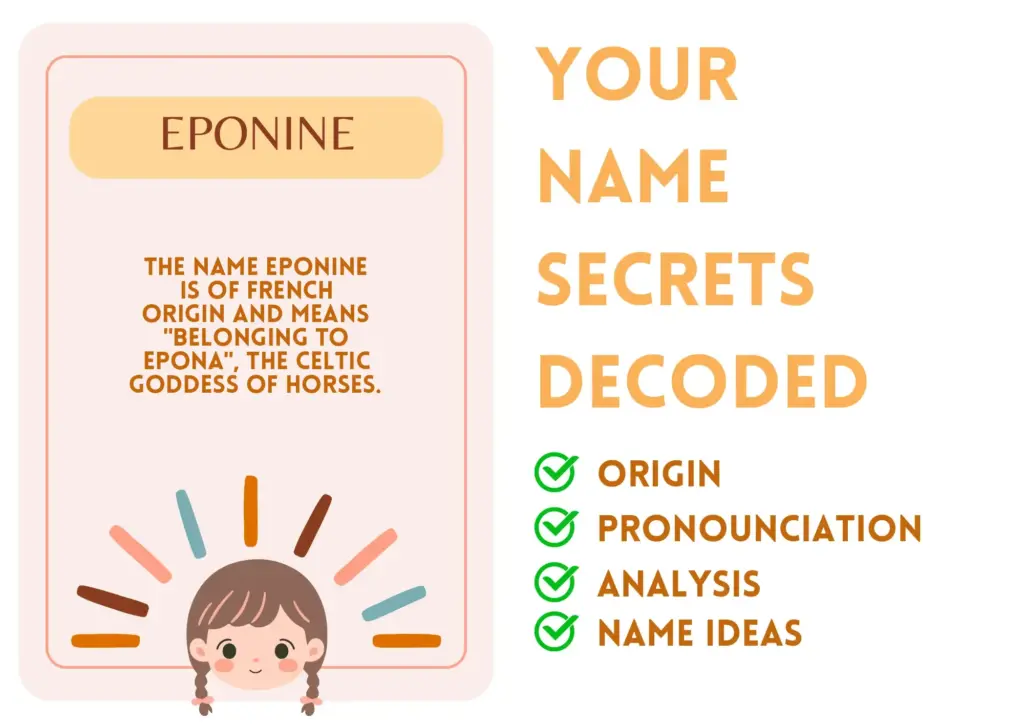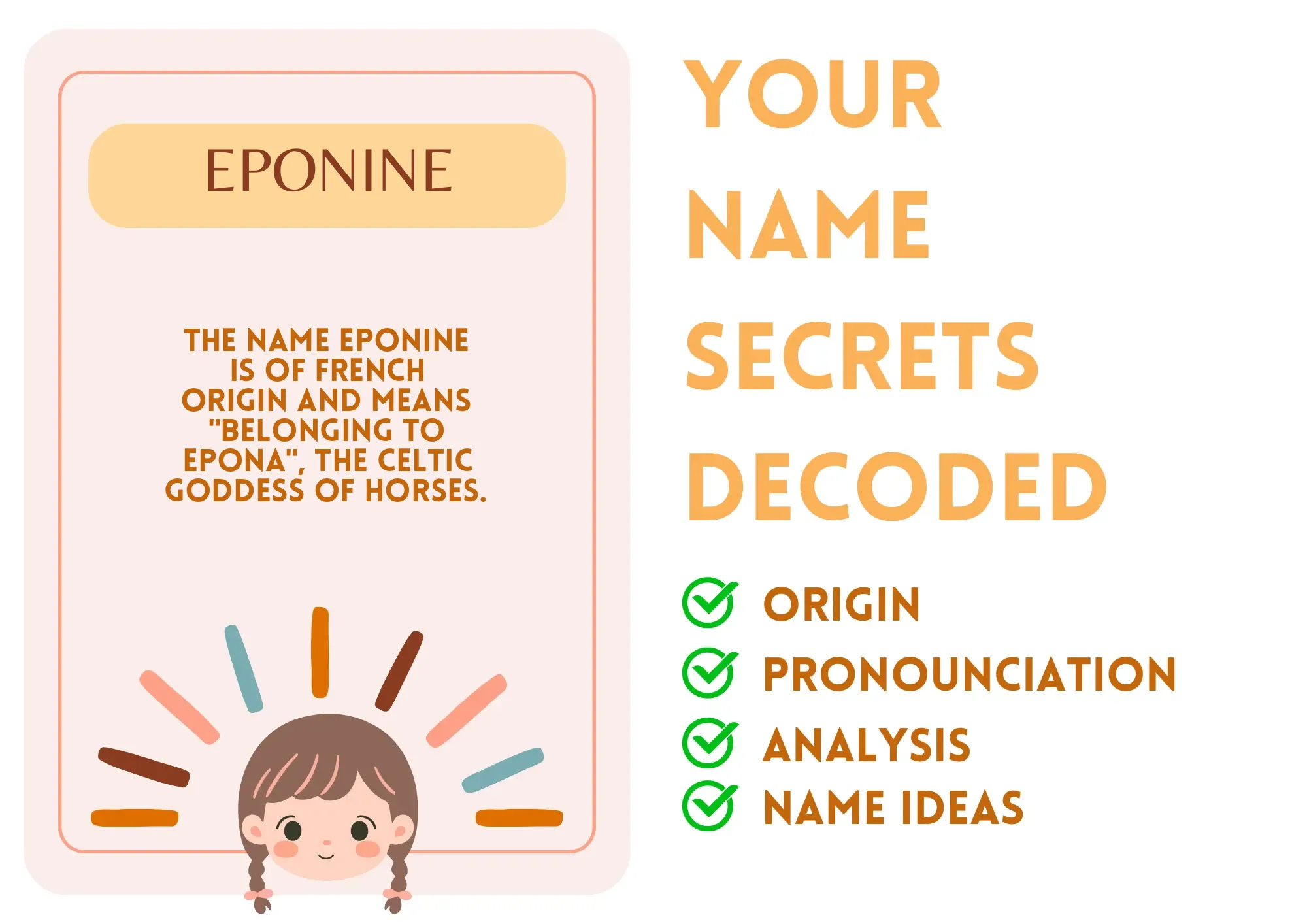
Eponine Name Meaning: Unveiling the History and Significance
The name Eponine, though not widely common, carries a certain literary charm and historical depth. If you’re curious about the Eponine name meaning, its origins, and its cultural significance, you’ve come to the right place. This article delves into the fascinating story behind the name, exploring its roots, popularity, and the character that immortalized it in literature.
Origins and Etymology of Eponine
The Eponine name meaning is somewhat debated, but most sources trace it back to Gaulish origins. It is believed to be derived from the name of a Celtic goddess, Epona, who was the protector of horses, donkeys, and mules. The suffix ‘-ine’ is a common diminutive suffix in French, suggesting ‘little Epona’ or ‘follower of Epona.’ This connection to a powerful and revered goddess lends the name a sense of strength and nobility.
The name Epona itself is thought to stem from the Gaulish word ‘epos,’ meaning ‘horse.’ Horses held a significant place in Celtic culture, representing power, wealth, and freedom. Therefore, the association of Eponine with Epona imbues the name with these positive connotations.
Eponine in Literature: Les Misérables
While the name Eponine might have remained relatively obscure, it gained widespread recognition thanks to Victor Hugo’s epic novel, Les Misérables. In the novel, Eponine Thénardier is a complex and tragic character. She is the daughter of the unscrupulous Thénardiers, and her life is marked by poverty, neglect, and unrequited love for Marius Pontmercy.
Hugo’s portrayal of Eponine is both sympathetic and heartbreaking. Despite her difficult circumstances, she possesses a deep capacity for love and loyalty. Her ultimate sacrifice, taking a bullet meant for Marius, solidifies her place as one of the most memorable characters in the novel. The tragic fate of Eponine in Les Misérables has undoubtedly influenced the perception of the name, adding a layer of melancholy and pathos to its appeal.
Popularity and Usage of the Name Eponine
The name Eponine has never reached widespread popularity. However, its association with Les Misérables ensures that it remains a recognizable and intriguing choice for parents seeking a unique and literary name. In recent years, there has been a slight increase in interest in the name, possibly due to the popularity of stage and film adaptations of Hugo’s novel.
While not common, the name Eponine is more frequently found in French-speaking countries, likely due to its origins and the enduring influence of Les Misérables. It is also occasionally used in English-speaking countries, often chosen by parents who appreciate its literary connection and its distinctive sound.
Character Traits Associated with the Name Eponine
Although a name doesn’t determine a person’s character, certain traits are often associated with names based on their history and cultural significance. Due to the character of Eponine in Les Misérables, the name is often linked to characteristics such as:
- Loyalty: Eponine’s unwavering loyalty to Marius, even in the face of unrequited love, is a defining characteristic.
- Selflessness: Her ultimate sacrifice demonstrates a profound capacity for selflessness.
- Resilience: Despite her difficult upbringing, Eponine displays remarkable resilience.
- Compassion: Despite her rough exterior, she possesses a compassionate heart.
It’s important to remember that these are just associations, and every individual is unique. However, the literary portrayal of Eponine has undoubtedly shaped the perception of the name and the qualities it represents.
Variations and Nicknames for Eponine
While Eponine is a relatively uncommon name, there are a few variations and nicknames that can be used:
- Epona: The root of the name, Epona, can be used as a shorter, more direct variation.
- Nina: A common and affectionate nickname.
- Eppie: A cute and playful nickname.
- Ponine: A shortened version of the name.
The Enduring Appeal of Eponine
The Eponine name meaning is more than just its etymological roots. It’s intertwined with a powerful story of love, sacrifice, and resilience. While the name may not be for everyone, it holds a certain appeal for those who appreciate its literary connection and its unique sound. It’s a name that evokes both strength and vulnerability, making it a compelling choice for parents seeking a name with depth and meaning.
Choosing the Name Eponine
If you’re considering the name Eponine for your child, it’s important to consider its associations and its overall sound. It’s a name that is both beautiful and tragic, and it carries a certain weight due to its literary significance. Consider whether you want your child to be associated with the character of Eponine Thénardier, and whether you feel the name aligns with your values and your aspirations for your child.
Ultimately, the decision of whether or not to choose the name Eponine is a personal one. However, by understanding its origins, its history, and its cultural significance, you can make an informed decision and choose a name that resonates with you and your family. The Eponine name meaning carries a legacy of both Celtic mythology and French literature. [See also: Popular Baby Names of Celtic Origin]
Modern Interpretations of Eponine
While Eponine’s story is rooted in a 19th-century novel, the themes it explores—love, sacrifice, and societal inequality—remain relevant today. Modern interpretations of the name often focus on these themes, portraying Eponine as a symbol of resilience and compassion in the face of adversity. Some see her as a feminist icon, a woman who defies societal expectations and fights for what she believes in, even if it means sacrificing her own happiness.
The enduring popularity of Les Misérables ensures that Eponine’s story will continue to resonate with audiences for generations to come. As new adaptations of the novel are created, new interpretations of the character will emerge, further shaping the perception of the name Eponine and its associated meanings.
Conclusion: The Enduring Legacy of Eponine
The Eponine name meaning is a rich tapestry woven from Celtic mythology, French literature, and enduring human emotions. From its roots in the worship of the horse goddess Epona to its immortalization in Victor Hugo’s Les Misérables, the name carries a legacy of strength, sacrifice, and compassion. While it may not be a common name, it is a name with depth, meaning, and a story to tell. If you’re looking for a unique and literary name for your child, Eponine is certainly worth considering. Its poignant history and beautiful sound make it a truly memorable choice. The tragic tale associated with the Eponine name may not be for everyone, but it certainly leaves a lasting impression. The Eponine character has made the Eponine name popular and recognizable. The Eponine story is ultimately one of love and loss. The Eponine name is forever connected to Les Misérables. Understanding the Eponine name meaning allows for a better appreciation of its significance. The name Eponine remains a unique choice. The character Eponine is memorable. The Eponine legacy is strong. Choosing the name Eponine is a personal decision. The Eponine name is meaningful.

